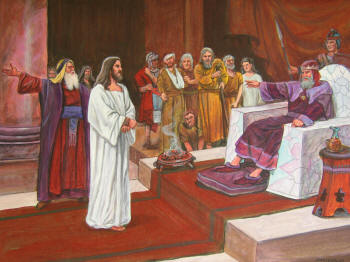“Is ‘Eternal Security’ a Biblical Teaching? – John 15:6

Is the doctrine of “Eternal Security,” also known as “Once Saved, Always Saved,” a Biblical teaching? Being “saved” is a Biblical teaching. For example, “For in this hope we were saved” (Romans 8:24 NIV). But, is it true that this is a “one and done” experience?
“I am the vine, you are the branches. Whoever remains in me, with me in him, bears fruit in plenty; for cut off from me you can do nothing. Anyone who who does not remain is thrown away like a branch—and withers; these branches are collected and thrown on the fire and are burnt”—John 15:5,6 NJB

 Did Jesus claim to be God when he was in court, on trial for his life? Like Jesus’ enemies, Trinitarians often assert that Jesus was “claiming to be God” (
Did Jesus claim to be God when he was in court, on trial for his life? Like Jesus’ enemies, Trinitarians often assert that Jesus was “claiming to be God” (